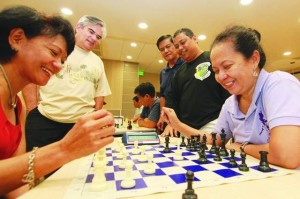30 September 2012
Chess blog for latest chess news and chess trivia (c) Alexandra Kosteniuk, 2012
Hi everyone,
Chess, seniors, staying young, keeping illness away…We always love to read articles about chess and benefits. Here’s one from guampdn.com titled “Staying active and challenging your mind: Lifelong habits for seniors could ward off Alzheimer’s disease”.

For Hermenegildo Moguel, many of life’s lessons can be summed up in a game: chess. “Chess is like everything you know about life,” Moguel said. “In chess you have to be patient. You cannot just move without thinking, so it teaches you to plan. It makes you avoid mistakes.”
Moguel, 81, is the secretary of Guam Echecs, an island chess club that meets on weekends. More than half of the club’s 70 or so members are over the age of 55, said president Leon Ryan.
Lifelong habits of staying mentally active — as well as exercising regularly — could ward off Alzheimer’s disease, according to AARP.
Alzheimer’s disease is a progressive brain disease that slowly destroys memory and thinking skills, according to the National Institute on Aging. As many as 5.1 million Americans suffer from the disease.
For Ryan, a major in the Guam Police Department, playing the game relieves the stresses of the day.
“I experience a therapeutic experience … in finding the right move in a very complicated situation,” he said.
Echecs, Ryan explains, means chess in French.
Both Moguel and Ryan have played chess since they were young men.
People with high levels of mental activity throughout their lives had lower levels of protein buildup in their brains, according to AARP. The presence of a protein that forms beta-amyloid plaques can be a telling sign of Alzheimer’s disease, AARP said.
Mental activity can include reading, writing, and playing games.
Chess is Ryan’s and Moguels’ game of choice. “For older people the main benefit is it keeps them sharp. It builds their brain muscles, so to speak,” Ryan said.
AARP said that eating right and exercising also contribute to preventing or delaying dementia. Reducing Alzheimer’s risk factors including obesity, diabetes, and smoking could help in prevention, AARP said.
Ryan is trying to expand the chess club and eventually wants to partner with schools to help more kids get involved in the game.
From Alexandra Kosteniuk’s
www.chessblog.com
Also see her personal blog at
www.chessqueen.com
Don’t miss
Hi everyone,
Chess, seniors, staying young, keeping illness away…We always love to read articles about chess and benefits. Here’s one from guampdn.com titled “Staying active and challenging your mind: Lifelong habits for seniors could ward off Alzheimer’s disease”.
Your move: Miriam Piana, left, awaits Glynis Almonte’s move as other members of the Guam ECHECS (Island Chess) Fide Zone 3.6 chess club watch their match at McDonald’s in Harmon on Sept. 23. Virgilio Valencia/For Pacific Sunday News

For Hermenegildo Moguel, many of life’s lessons can be summed up in a game: chess. “Chess is like everything you know about life,” Moguel said. “In chess you have to be patient. You cannot just move without thinking, so it teaches you to plan. It makes you avoid mistakes.”
Moguel, 81, is the secretary of Guam Echecs, an island chess club that meets on weekends. More than half of the club’s 70 or so members are over the age of 55, said president Leon Ryan.
Lifelong habits of staying mentally active — as well as exercising regularly — could ward off Alzheimer’s disease, according to AARP.
Alzheimer’s disease is a progressive brain disease that slowly destroys memory and thinking skills, according to the National Institute on Aging. As many as 5.1 million Americans suffer from the disease.
For Ryan, a major in the Guam Police Department, playing the game relieves the stresses of the day.
“I experience a therapeutic experience … in finding the right move in a very complicated situation,” he said.
Echecs, Ryan explains, means chess in French.
Both Moguel and Ryan have played chess since they were young men.
People with high levels of mental activity throughout their lives had lower levels of protein buildup in their brains, according to AARP. The presence of a protein that forms beta-amyloid plaques can be a telling sign of Alzheimer’s disease, AARP said.
Mental activity can include reading, writing, and playing games.
Chess is Ryan’s and Moguels’ game of choice. “For older people the main benefit is it keeps them sharp. It builds their brain muscles, so to speak,” Ryan said.
AARP said that eating right and exercising also contribute to preventing or delaying dementia. Reducing Alzheimer’s risk factors including obesity, diabetes, and smoking could help in prevention, AARP said.
Ryan is trying to expand the chess club and eventually wants to partner with schools to help more kids get involved in the game.
From Alexandra Kosteniuk’s
www.chessblog.com
Also see her personal blog at
www.chessqueen.com
Don’t miss






